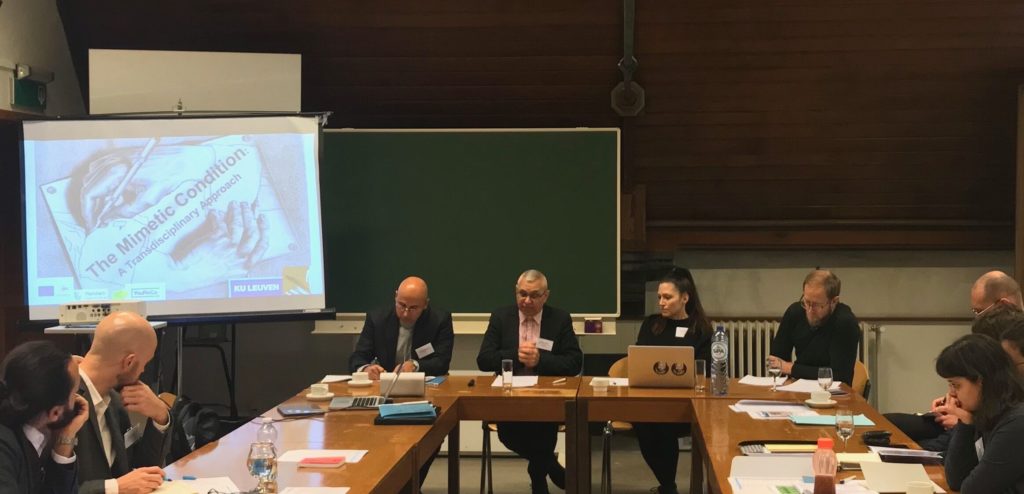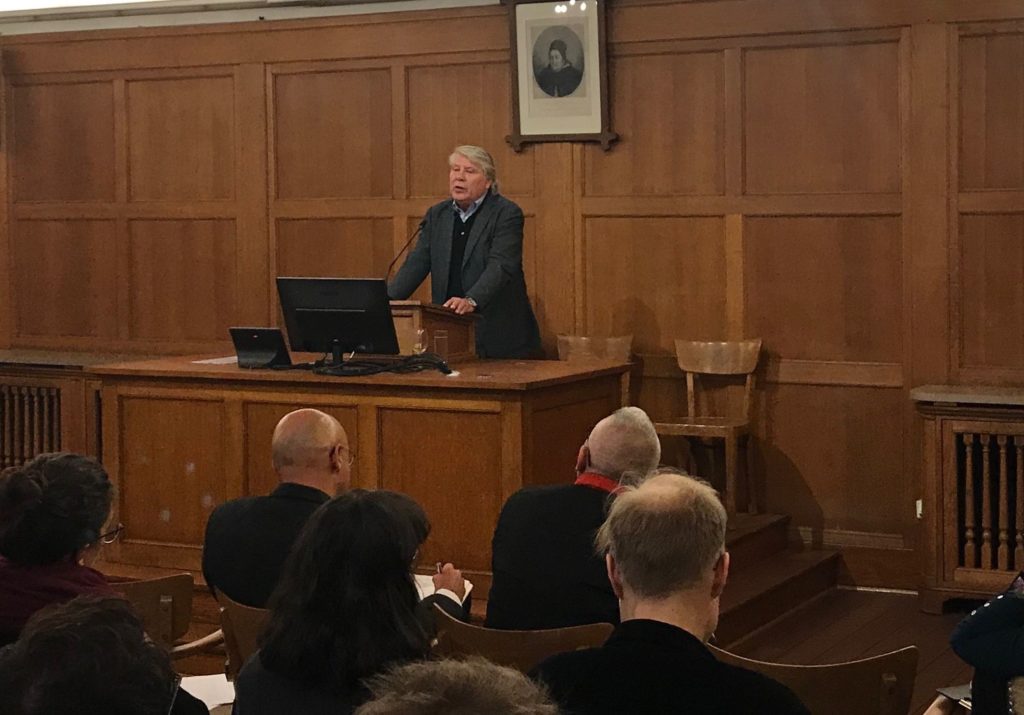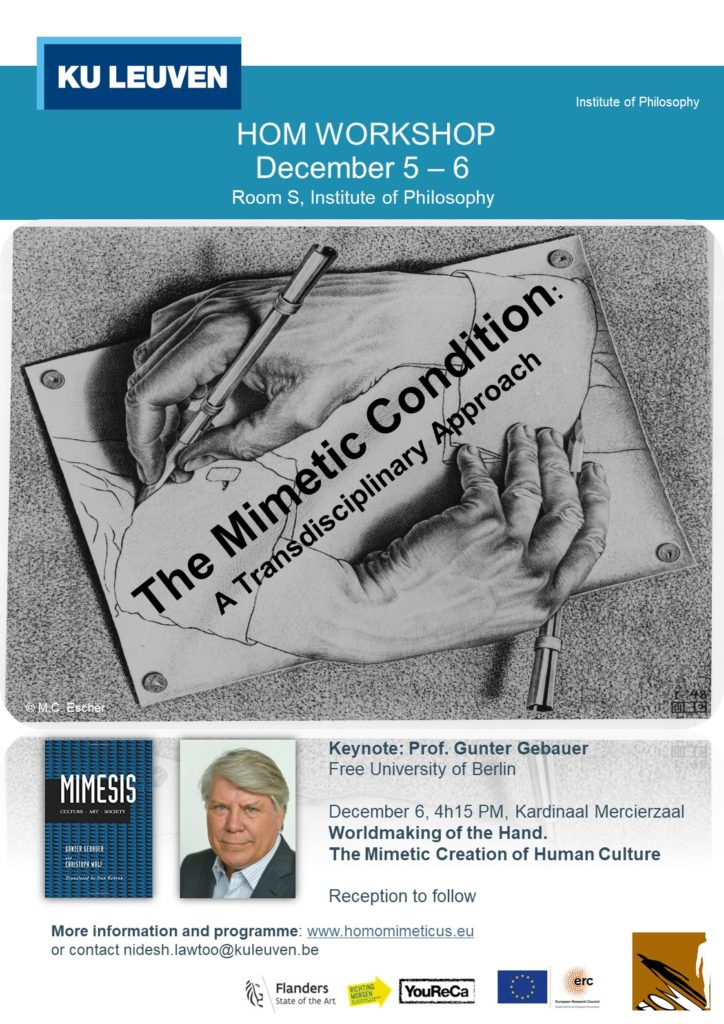In this video presentation for the 2020 Joseph Conrad Society (UK) Annual Meeting shot on the Furka Pass (Swiss Alps), ERC grantee Nidesh Lawtoo introduces the relevance of Conrad’s mimetic turn to face contemporary catastrophes like (new) fascist politics, viral pandemics, and climate change in the Anthropocene. https://www.jstor.org/stable/10.14321…
Category Archives: News
The Case of Eichmann Restaged: Arendt, Evil, and the Complexity of Mimesis

In The Case of Eichmann Restaged, Nidesh Lawtoo reframes Hannah Arendt’s evaluation of the “banality of evil” in light of Eichmann’s mimetic psychology, which Arendt intuited but did not fully articulate.
Rather than considering the banality of evil as symptomatic of Eichmann’s “inability to think,” the essay foregrounds the affective, contagious, and, in this sense, mimetic tendencies at play in Eichmann’s personality (from Latin, persona, theatrical mask). This move is instrumental to articulate a middle path between Arendt’s theoretical diagnostic of Eichmann as “terrifyingly normal” and Bettina Stangneth’s recent historical account of Eichmann as a “fanatical National Socialist.” My wager is that the ancient problematic of mimēsis (from Greek, mimos, mime) casts a new and original light on the psychic foundations of a type of evil that is as relevant to understand the psychology of fascism in the past century as its rising shadow in the present century. Article also available here
Mimetologies: Mimesis and Music 1600-1850 by Daniel Villegas Velez (Forthcoming with OUP)
The HOM project is pleased to announce that Daniel Villegas Velez’s book, Mimetologies is forthcoming with Oxford University Press.
Mimetologies examines the critical aesthetic concept of mimesis in the history of musical aesthetics. Two main interpretations of mimesis or, as this book calls them, mimetologies dominate aesthetic theory. On the one hand, mimesis is an aesthetic problem rooted in the distinction between copies and originals, as well as the creation of fictional worlds. On the other hand, mimesis involves a complex of neuro-psychological tendencies to copy or imitate others that characterizes the human as Homo mimeticus and which grounds the genesis of subjects and communities. These two mimetologies—one emphasizing vision and authenticity, the other affective contagion and becoming—run largely separate and music appears to have no place in either. Yet, as this book demonstrates, music is at the origin of both.
Mimetologies continues an interrogation of mimesis initiated by Jacques Derrida and Philippe Lacoue-Labarthe (1976) and genealogical examinations of the role of mimetic behavior in the formation of subjectivity to highlight music’s function in mobilizing affective performance to shape communities. Adopting a long-term historical perspective that extends from ancient Greece through seventeenth-century Italy, eighteenth-century France, to early nineteenth-century Germany—with an ear to their resonances in Colonial Latin America—Mimetologies shows that mimesis has been a constant undercurrent in the history of modern music, especially at the moments when music and mimesis seemed most distant from one another. By revealing the role of mimetic musical performance between aesthetics and politics—mimesis as representation and mimesis as contagion—Mimetologies reintegrates music into the history of aesthetics, while providing new conceptual tools to critically think the role of music in Western society.

The cover of Mimetologies features Santiago Reyes Villaveces’s site-specific installation Harp (2019), developed in collaboration with the author and winner of the 41st Premio Matteo Olivero. Comprised of an expanded copy of a Baroque harp found in former Jesuit Missions in Colombia and transposed to the sacristy of a Jesuit church in Saluzzo, Italy, Harp reflects on the colonial mobilization of ancient Greek musical paradigms to (re)form communities in the “New World”. By examining how such humanist mimetologies are created and disseminated, this study amplifies contemporary critiques of Eurocentric values that shape the history of music in the West.
HOM Videos, ep. 5. Philosophy and Mimesis: Jean-Luc Nancy (Trailer)
In the fifth episode of HOM Videos, Nidesh Lawtoo meets French philosopher Jean-Luc Nancy (U of Strasbourg) to discuss the ancient quarrel between philosophy and mimesis. Topics discussed include the relation between mimesis, myth, fascist politics, Lacoue-Labarthe, deconstruction and community.
HOM Videos, ep. 4: The Anthropology of Mimesis: Christoph Wulf
In this fourth episode of HOM Videos anthropologist Christoph Wulf (Freie U of Berlin) builds on his seminal book, Mimesis: Culture-Art-Society (with Gunter Gebauer) to discuss the centrality of mimesis in ritual festivals, both in Europe and in Japan, in the construction of cultural identities, and in education and social life more generally.
COVID-19: Viral Contagion / Mimetic Contagion
What is the link between mimetic contagion and viral contagion? Building on a diagnostic insight that called attention to the danger of “contemporary pandemics that, every year, threaten to contaminate an increasingly globalized, permeable, and precarious world,” and, already in 2016, warned that “the shadow of epidemics looms large on the horizon” (chapter on “The Cooperative Community: Surviving Epidemics in The Shadow-Line“), the HOM project continues the diagnostic in the context of COVID-19 in a series of interviews and posts.
Given the rapid global spread of coronavirus, it is increasingly essential to distinguish between viral contagion based on medical facts, and emotional reactions based on mimetic reflexes. In this radio interview, Nidesh Lawtoo cautions against mimetic affects, like panic, but also distinguishes between ideologically-driven forms of mimetic contagion and empirical viral contagion. If (new) fascist politicians spread lies about COVID-19, the latter should not be downplayed for economic reasons. It should rather lead citizens to listen to scientists and become aware of (and restrain) unconscious mimetic reflexes and habits (e.g., large assemblages, shaking hands etc.). Full radio interview (in Italian) with RSI, Rete 1 here ; written interview for LaRegione here.
Wojciech Kaftanski follows up on the diagnostic with a piece on mimetic contagion and COVID-19 for ABC that shows “how deeply we influence one another: from fights over toilet paper to declarations of war.” Article available here. Nidesh continues with a genealogy of mimesis–via Plato, Nietzsche and The Matrix–to face viral contagion in the Anthropocene in a piece for Fatamorgana. And in an interview for MSU Press’s Podcast, Nidesh discusses his new book (New) Fascism: Contagion, Comunity, Myth (MSU P 2019) in the context of the current pandemic crisis. You can listen to the podcast here.
Daniel Villegas Velez takes a forthcoming HOM interview with Jean-Luc Nancy as a starting point to reflect on the “Allegories of Contagion” that take COVID-19 as a “magnifying mirror” to reflect on (new) fascism. And in Lawtoo’s “The Mimetic Virus“ all these threads are woven together to “rethinking mimesis in the age of COVID-19” in The Contemporary Condition.

HOM Videos ep.3, The Complexity of Mimesis: Edgar Morin
In this third episode of HOM Videos, French sociologist, philosopher and founder of complexity theory, Edgar Morin discusses the complexity of mimesis: from the anthropology of the double to cinematic identifications, ethics to politics, mimicry to the birth of art, homo mimeticus turns out to be constitutive of Morin’s complex view of human nature. Trailer here.
Workshop, “The Mimetic Condition: A Transdisciplinary Approach
Since the publication of Gunter Gebauer and Christoph Wulf’s seminal book, Mimesis: Culture- Art-Society in 1992, the realization that mimesis is constitutive of the human condition has become central to the humanities, the arts, the social sciences, stretching to inform the hard sciences as well. Furthering Gebauer and Wulf’s call to examining the productive aspect of mimesis as a “human condition,” the ERC-funded Homo Mimeticus: Theory and Criticism (HOM) project convokes a two-day transdisciplinary workshop at the Institute of Philosophy, KU Leuven, to explore the afterlives of the mimetic condition in the twenty-first century.

December 5-6, 2019,Room S, Institute of Philosophy, KU Leuven (Belgium) Keynote: Prof. Gunter Gebauer (Free University of Berlin) “Worldmaking of the Hand: The Mimetic Creation of Human Culture”


Inaugural Lecture: Nidesh Lawtoo: ‘Homo Mimeticus. Sameness and Difference Replayed.’
In this Inaugural Lecture, PI of ERC-funded HOM Project Nidesh Lawtoo revisits the legendary 1966 Johns Hopkins Conference, “The Languages of Criticism and the Sciences of Man,” an event which was meant to introduce structuralism in the US, yet ended up inaugurating what became known as poststructuralism instead. At one remove, replaying mimesis in the company of Derrida and Girard half a century later still provides a genealogical starting point to rethink the all too human tendency to imitate characteristic of Homo Mimeticus.
November 7, 2019, Institute of Philosophy, Kardinaal Mercierzaal, 5-7pm (followed by reception).
Book launch of (New) Fascism (2019)
In conversation with Wojciech Kaftanski, Nidesh Lawtoo presents his last book, (New) Fascism (MSU P 2019) at the Institute of Philosophy (Husserl Archives, KU Leuven, October 2019). A diagnostic of crowd behavior, mythic identifications, and mimetic contagion constitutive of the growing shadow of fascism.

